
John Marwood Cleese is an English actor, comedian, screenwriter, producer, and presenter. Emerging from the Cambridge Footlights in the 1960s, he first achieved success at the Edinburgh Festival Fringe and as a scriptwriter and performer on The Frost Report. In the late 1960s, he cofounded Monty Python, the comedy troupe responsible for the sketch show Monty Python's Flying Circus. Along with his Python costars Terry Gilliam, Eric Idle, Terry Jones, Michael Palin, and Graham Chapman, Cleese starred in Monty Python films, which include Monty Python and the Holy Grail (1975), Life of Brian (1979), and The Meaning of Life (1983).
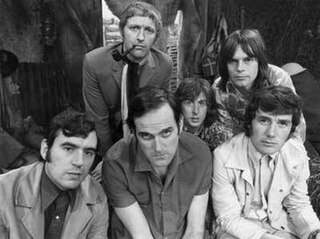
Monty Python were a British comedy troupe formed in 1969 consisting of Graham Chapman, John Cleese, Terry Gilliam, Eric Idle, Terry Jones, and Michael Palin. The group came to prominence for the sketch comedy series Monty Python's Flying Circus, which aired on the BBC from 1969 to 1974. Their work then developed into a larger collection that included live shows, films, albums, books, and musicals; their influence on comedy has been compared to the Beatles' influence on music. Their sketch show has been called "an important moment in the evolution of television comedy".

Sir Michael Edward Palin, is an English actor, comedian, writer, and television presenter. He was a member of the Monty Python comedy group. He received the BAFTA Fellowship in 2013 and was knighted by Queen Elizabeth II in 2019.
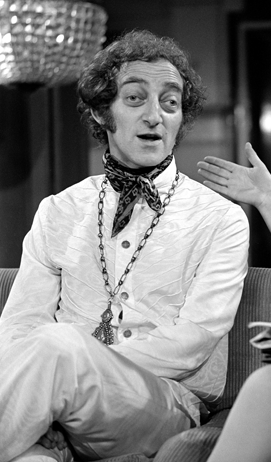
Martin Alan Feldman was a British actor, comedian and comedy writer. He was known for his prominent, misaligned eyes.

Ronald William George Barker was an English actor, comedian and writer. He was known for roles in British comedy television series such as Porridge, The Two Ronnies, and Open All Hours.

Barry Charles Cryer was an English writer, comedian, and actor. As well as performing on stage, radio and television, Cryer wrote for many performers including Dave Allen, Stanley Baxter, Jack Benny, Rory Bremner, George Burns, Jasper Carrott, Tommy Cooper, Ronnie Corbett, Les Dawson, Dick Emery, Kenny Everett, Bruce Forsyth, David Frost, Bob Hope, Frankie Howerd, Richard Pryor, Spike Milligan, Mike Yarwood, The Two Ronnies and Morecambe and Wise.
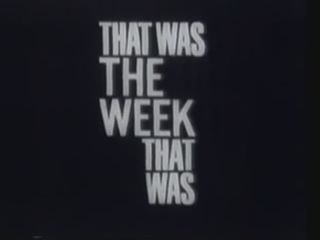
That Was the Week That Was, informally TWTWTW or TW3, was a satirical television comedy programme that aired on BBC Television in 1962 and 1963. It was devised, produced, and directed by Ned Sherrin and Jack Duncan, and presented by David Frost.

At Last the 1948 Show is a satirical television show made by David Frost's company, Paradine Productions, in association with Rediffusion London. Transmitted on Britain's ITV network in 1967, it brought Cambridge Footlights humour to a broader audience.
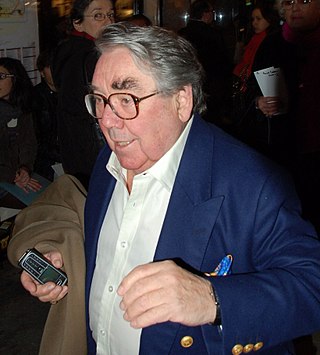
Ronald Balfour Corbett was a Scottish actor, broadcaster, comedian and writer. He had a long association with Ronnie Barker in the BBC television comedy sketch show The Two Ronnies. He achieved prominence in David Frost's 1960s satirical comedy programme The Frost Report and subsequently starred in sitcoms such as No – That's Me Over Here!, Now Look Here, and Sorry!

The Two Ronnies is a British television comedy sketch show starring Ronnie Barker and Ronnie Corbett. It was created by Bill Cotton and aired on BBC1 from 10 April 1971 to 25 December 1987. The usual format included sketches, solo sections, serial stories and musical finales.

Edwin Charles Braben was an English comedy writer and performer best known for providing material for Morecambe and Wise. He also worked for David Frost, Ronnie Corbett and Ken Dodd.
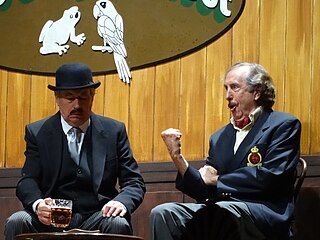
"Candid Photography", better known as "Nudge Nudge", is a sketch from the third Monty Python's Flying Circus episode, "How to Recognise Different Types of Trees From Quite a Long Way Away" featuring Eric Idle and Terry Jones as two strangers who meet in a pub.
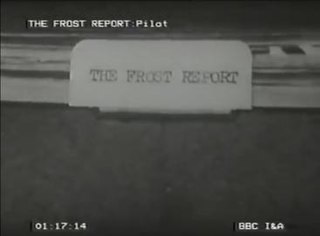
The Frost Report is a satirical television show hosted by David Frost. It introduced John Cleese, Ronnie Barker, and Ronnie Corbett to television, and launched the careers of other writers and performers. It premiered on BBC1 on 10 March 1966 and ended on 12 December 1967, with a total of 26 regular episodes over the course of 2 series and 2 specials as well.
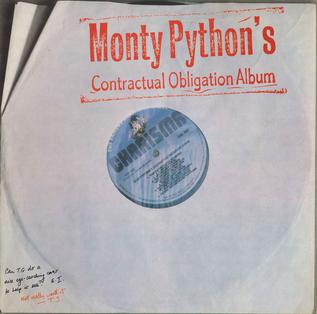
Monty Python's Contractual Obligation Album is the final studio album by Monty Python, released in 1980. As the title suggests, the album was put together to complete a contract with Charisma Records. Besides newly written songs and sketches, the sessions saw re-recordings of material that dated back to the 1960s pre-Python shows I'm Sorry, I'll Read That Again, The Frost Report, At Last The 1948 Show and How To Irritate People. One track, "Bells", dates from the sessions for Monty Python's Previous Record, while further material was adapted from Eric Idle's post-Python series Rutland Weekend Television. The group also reworked material written but discarded from early drafts of Life Of Brian, as well as the initial scripts for what would eventually become The Meaning Of Life.

The Two Ronnies Sketchbook is a collection of sketches from the BBC comedy series The Two Ronnies, with newly filmed introductions by the stars, Ronnie Barker and Ronnie Corbett. It was first broadcast 34 years after the first episode of The Two Ronnies was aired and 18 years after the final episode aired.

Four Candles is a sketch from the BBC comedy show The Two Ronnies, written by Ronnie Barker under the pseudonym of Gerald Wiley and first broadcast on 18 September 1976. Comic effect is largely generated through word play and homophones as an ironmonger or hardware shopkeeper, played by Ronnie Corbett, becomes increasingly frustrated by a customer, played by Barker, because he misunderstands what the customer is requesting.

The Rise and Rise of Michael Rimmer is a 1970 British satirical film directed by Kevin Billington, and starring Peter Cook, Vanessa Howard and John Cleese. It was co-written by Cook, Cleese, Graham Chapman and Billington. The film was devised and produced by David Frost under the pseudonym "David Paradine".
Christmas Night with the Stars is a television show broadcast each Christmas night by the BBC from 1958 to 1972. The show was hosted each year by a leading star of BBC TV and featured specially-made short seasonal editions of the previous year's most successful BBC sitcoms and light entertainment programmes. Most of the variety segments no longer exist in accordance with the BBC's practice of discarding programmes at the time.
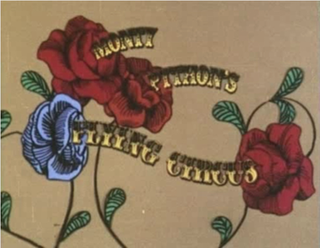
Monty Python's Flying Circus is a British surreal sketch comedy series created by and starring Graham Chapman, John Cleese, Eric Idle, Terry Jones, Michael Palin, and Terry Gilliam, who became known collectively as "Monty Python", or the "Pythons". The first episode was recorded at the BBC on 7 September 1969 and premiered on 5 October on BBC1, with 45 episodes airing over four series from 1969 to 1974, plus two episodes for German TV. A feature film adaptation of several sketches, And Now for Something Completely Different, was released in 1971.
The One... is a comedy sketch television series starring Ronnie Corbett, of The Two Ronnies, Lenny Henry of The Lenny Henry Show, Jasper Carrott, comedian and former presenter of ITV game show Golden Balls and Welsh comedian and actor Griff Rhys Jones, also presenter of ITV clip series It'll Be Alright on the Night. It was devised by Matt Lucas, David Walliams and Geoff Posner for Little Britain Productions. Walliams departed the project by the time of the full series.

















